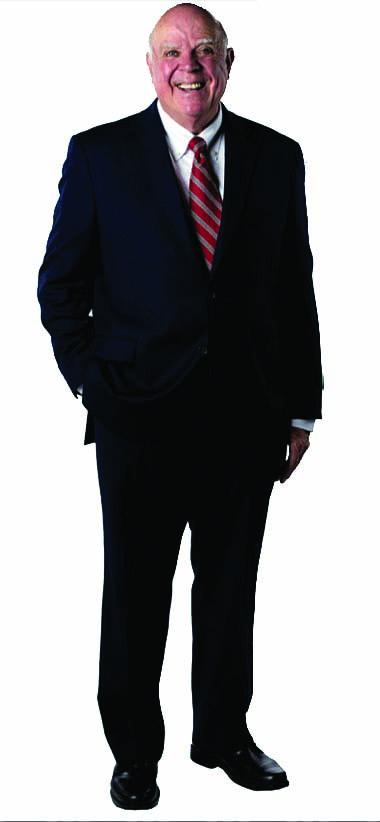October 29, 2020

Dorchester’s Jim Hunt, Jr. retired from his post as president and CEO of the Mass League of Community Health Centers last week. Photo courtesy BMRB
James W. Hunt, Jr. of Dorchester, the executive director of the Massachusetts League of Community Health Centers, announced last Friday that he will retire in December after more than four decades working with and leading the health care group.
Hunt, 71, will be succeeded by current deputy CEO and legal counsel Michael Curry.
Founded in 1972 with a mission to promote quality community health care, the Mass League was one of the first Primary Care Associations (PCAs) in the country, set up under federal law promoting health center programs in medically underserved communities nationwide.
The organization supports 52 health centers across Massachusetts, including eight in Dorchester and Mattapan.
Hunt first became active in the field while volunteering with his wife, Jean Costigan Hunt, RN, at the Neponset Health Center. He left a civil engineering job in City Hall to join the league as director of government and community affairs. He quickly became known as a leading expert in community health.
“Jim Hunt is the chief architect of some of the most important health policy, regulatory, and funding initiatives impacting the Commonwealth’s most underserved and under-resourced communities over the last five decades,” said Elizabeth Browne, chair of the Mass League’s board.
Said his longtime friend, former state Sen. W. Paul White: “Jim’s remarkable skills and foresight have allowed him to create not only a strong and vibrant league of community health centers, but also to offer services throughout the country through subsidiaries he has created at the League,” said White.
“His Commonwealth Purchasing Group offers PPE equipment, supplies, and office items to health centers all around the country,” added White.
“He also has a financial planning and advising group to allow health centers to get financial advice on how to proceed with various transactions – loans, mortgages, construction plans, etc.
“He has also been a recognized counsellor for elected officials,” White said. “In the old days, he would routinely hear from Ted Kennedy, who sought his down-to-earth, sensible, richly-informed advice. Jim’s instincts and intellect have constructively improved health care here in Massachusetts and throughout the country for millions. Not a bad legacy!”
Victoria Reggie Kennedy, widow of the late senator and a longtime Hunt friend, phoned him late Friday to congratulate him. She told the Boston Globe this week that “He made community health centers central to health care reform. He sees the big picture. He seems to be ever-present. He always looks to the future. And I honestly do not know anyone who doesn’t like Jim Hunt.”
A 2011 story in the Boston Irish Reporter — which honored the Hunt family with a Boston Irish Honor award that year— recounted the beginning of his career:
“He continued at his day job, as a city employee, and among his responsibilities was the hydrant program – deterring kids from turning on hydrants on hot days. ‘The police wanted to break their heads,” said Hunt, ‘but I hired multi-cultural crews to help negotiate and offer sprinklers for the neighborhoods if the kids would agree not to open the hydrants.
“In 1978, Jim was hired to lead the organization that he had just joined a year earlier. He found it deeply in debt.
“The city and the health centers statewide were at loggerheads over racial and financial issues, and two things occurred to me,” Hunt recalled in a 2011 interview. “First, I remembered my father’s training – that is, there was too much bonding these people for them to be fighting, so let’s find what binds rather than what separates them. We’d have hours of meetings, and they’d be yelling and screaming at one other, and my strategy was to create a coalition and leave divisions in the parking lot.”
Among the debts was a hefty loan that was taken to finance a shared laboratory among health centers, even though the centers had vetoed the idea.
“I had two choices,” says Jim. “Fib or tell the truth. I decided to tell the truth. So, I went to the bank and said to the chairman, ‘I’m a kid. I’m 28. Of the $100,000 you gave us, we owe you $55,000. The League is broke. I have to lay off staff. I have only $14,000 in the checking account. I don’t know how I can pay you back.’”
The banker surprised Jim, as he recalled, saying: “I appreciate that. We’ll write off the loan. Have a nice day.”
“I said to myself, ‘Wow! Transparency works.’ But still, I had to scale the staff down to zero.”
The league has grown exponentially in size, influence, and membership since then on Hunt’s watch.
Curry, a 52-year-old Roxbury native who now lives in Brockton, served as a past president of the Boston chapter of the NAACP and is an attorney.



